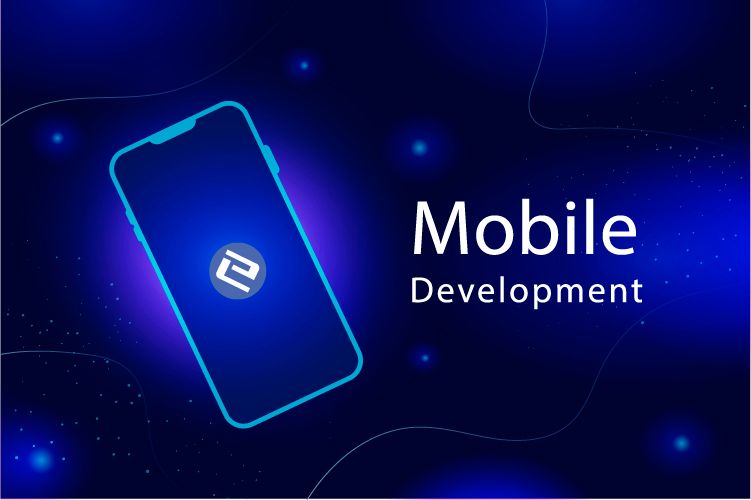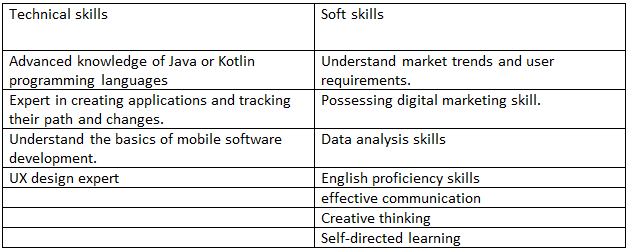ui-ux-design-an-introductory-overview

Mobile development has contributed to opening a new gateway to the digital world today. The recent digital revolution has caused the rapid spread of smartphones and their various applications. This, in turn, imposed the necessity of developing and updating mobile programs to keep pace with modern technology fields. This is within the framework of helping individuals and companies create their own applications that meet customer needs and contribute to achieving their goals. Through this article, we will explain to you in detail what is mobile development? We will also review its functions and basics, as well as pointing out the work of a mobile application developer and their tasks and skills required in the competitive market.
Mobile development
Mobile development is the process of creating and designing applications and software for smart mobile devices. It includes all stages of construction, starting from defining the initial idea for the application and the broad outlines of the design, through its implementation and testing, all the way to its launch through well-known application stores.
Mobile development features
The field of mobile development offers many technical benefits and advantages, which are as follows:
- The ability to create various programs for smart phones, suitable for personal use or for various companies and institutions.
- Achieving access to the largest number of target audiences around the world by developing mobile applications to meet their needs.
- Mobile development enables instant interaction with digital content and features in apps.
- Create and design custom applications, tailored to individual user requirements.
- Obtaining financial profits by developing applications through the inclusion of advertisements, direct sales, or subscriptions.
Mobile development jobs
The field of mobile development provides a variety of the following specialized functions:
- Mobile application developer: The person responsible for overseeing all stages of application development, from requirements analysis to writing code, testing and launching the application.
- User interface designer: He is the person responsible for designing the application interface to make it easy to use and attractive. It is necessary to have creative skills and full knowledge of user requirements, as well as a real familiarity with the principles of user interface design.
- Software testing engineer: A software testing engineer has strong analysis skills and thorough knowledge of software testing methods. His job also includes testing applications and programs and verifying that they are free of any problem or technical error, to ensure that they operate in an easy and reliable manner.
- Mobile application development project manager: They must prioritize and manage resources for creating mobile applications. In addition to their primary role in planning and implementing a smartphone application development project.
- Mobile application data analyst: A mobile data analyst should collect and analyze data on each app's usage. Therefore, he must be familiar with extracting results from the entered data and converting them into actionable recommendations.
- API Developer: Their job is to design and create APIs that allow other applications to interact with the application.
- Mobile app content writer: A content writer is the person responsible for preparing and writing content for the application, such as texts, instructions, and descriptions that ensure its optimal marketing.
Mobile development basics
Those wishing to enter the field of mobile development must know and learn the following:
Learn programming languages
It is necessary to focus on learning the following smartphone programming languages:
- The programming language for Android phones is Java or Kotlin.
- The primary programming language for iOS app development is Swift.
- As well as cross-platform development languages such as Flutter and React Native that allow creating applications that work on both Android and iOS.
Learn about mobile development tools
The most popular mobile development tools are:
- Android Studio: The official development tool for Android applications.
- Xcode: the official development tool for iOS apps.
- Other development tools: There are many other tools available to mobile app developers, such as text editors, version control tools, and app testing tools.
Knowledge of user interface design principles
Beginner mobile developers should understand the following UI design principles:
- The user interface should be easy to use for users.
- The user interface must also be attractive and enjoyable for users.
- The user interface should be compatible with different screen sizes and display resolutions.
Mobile application developer tasks
Mobile application developer tasks include:
- Analyze user needs and application objectives.
- Collaborate with application owners to fully understand the requirements.
- Determine what functions and features the application should include.
- User interface design by creating interface prototypes and drawings.
- Writing the code necessary for the application to work.
- Use programming languages and development tools appropriate for the application platform for Android or iPhone.
- Test the application to ensure it is free of bugs, and fix them if any.
- Launch the app on the appropriate app store (Google Play Store or App Store).
- Maintaining and constantly updating the application.
Mobile application developer skills
Mobile developers must possess a set of technical and soft skills shown in the following table:

In this article, in which we learned about the concept of mobile development its basics and functions. We can say that mobile phone development is a promising field. Rich in opportunities and challenges, but with the acquisition of the necessary experience and skills, mobile application developers can reserve an advanced position for themselves in building the next digital future.